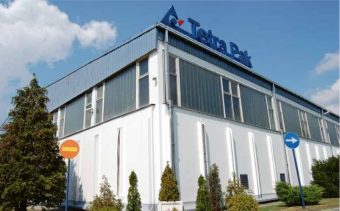
Some would say that after 70 years of existence, a company would not have any challenges to face. Tetra Pak company’s employees are still full of life and energy, but also responsible towards future generations, in terms of food safety and environmental protection. It arrived in Serbia as a pioneer of foreign investments and kept growing together with the country’s economic prosperity.
Globally speaking, Tetra Pak is a leader in multilayered food and beverage cardboard packaging and process equipment for this industry. Their products reach more than 160 markets around the world, whereas more than 25,000 employees work daily to ensure food safety everywhere and anytime. The current global covid-19-related crisis has proven how much what they do matters for the food industry and the functioning of the economy as a whole. Their entire business model relies on two assumptions: (1) food safety and (2) sustainable development – and these intertwine in everything they do.
Dragan Rajković, Regional Director of Sustainable Development at Tetra Pak Central and Eastern Europe, says the sector he manages covers the development of the circular economy through investments in recycling and cooperation with state authorities in the most efficient packaging waste management systems. Besides that, it is worth mentioning biodiversity protection through responsible resource management and complete certification of all naturally processed materials, as well as fighting climate changes by using low-carbon materials and reduction of emissions throughout the production and value chain.
In focus:
“Since our very beginning here, Serbia has been our reliable business partner and an ever-full source of talents for domestic and global operations. One of our priorities is to establish and develop an efficient packaging waste management system. It would reduce the amount of waste, develop the necessary gathering and sorting infrastructure, as well the competitiveness of all kinds of packaging waste among recyclers. We make a lot of effort as Tetra Pak, but also with the Serbian industry associations to point out to the Serbian government about the best European and global examples and create packaging waste depositing system to serve as an example for this part of the world. Recently, we proved in Kragujevac and Belgrade that this is possible and that the citizens respond to this very positively and ask for more gathering and packaging depositing devices, so there are no obstacles whatsoever for any packaging materials to enter the depositing system. A recent study by a well-known research company showed the same results,” Rajković says.
The goal is a comprehensive packaging deposit

At the moment, Serbia and the region need to get a solution that is to form a full circle of circular economy, that would not confuse the consumers nor discriminate climate-friendly packaging solutions, such as cardboard packaging. Only a comprehensive depositing system is a good and efficient system. All other options mean waste piling and increasing costs per waste unit.
“Our goal is very simple, and it subsumes that not a single Tetra Pak pack becomes waste. Our ambition is to collect and recycle 90 percent of our packaging by 2030. Serbia is definitely on that track. Currently, there are two Tetra Pak packaging recyclers in Serbia. These are Feplo factory from Čačak and Brzan Plast from Batočina. We have partnered in the latter almost a decade ago on the installation of the first complete recycling plant for used Tetra Pak packaging.
Most municipalities enable the citizens to correctly dispose of used Tetra Pak packaging, which is then recycled in the aforementioned plants.
Read the story in the new issue of the Energy portal Magazine RECYCLING.
Translator Vesna Savić
